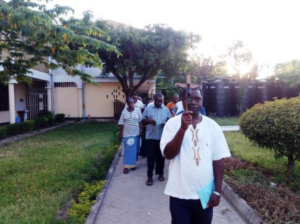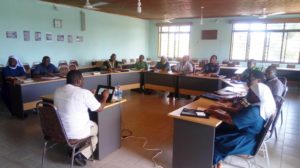Our participating in the process of ‘”knowing’ who am I and what am’ in order to be “healed, refreshed, re- energized and integrated for Christ’s mission” took us the dimension of “spiritual thanksgiving.” It was in a way a call from “being grateful to bring gracefulness “. Our facilitator was no other but Rev. Fr. Oswald MALYA, M. Afr. To him, there is a need to bring ourselves as we are and with what we have in Thanksgiving, to Our Creator. It is a movement of willingly handover ourselves as an offering for a renewal for the purpose of the mission. In this movement of handing over, the facilitator proposed some steps.
- Time for Scanning: This is the time in our life journey we identify, select and decide what is to be renewed, refreshed, re-energized and integrated for the Mission of Christ. Thus, there is need to sit and look deep into the self. It is only in doing so, we can regain that dimension of being “more affective than effective “ cf. Hos. 11:1-4; Is. 6:1-8.
- Relationship with God: There is need to be aware of the presence of God that is constant in our journey. Most cases, we look forward Him and tend to establish a deeper relationship only in times of trouble and pain. However, we are brought
to that awareness of God being there all the time as an expression of His love and nature. CD. PS. 139; Is. 41:8ff - Reality of Sin: Gn.3:6-7. When we are preoccupied solely with material achievements, we lose sense of who God is to us. Losing sense of who God is, takes us away from doing His will. Not doing God’s will but ours, is what is called Sin. Sin as we have come know is an act “pleasing to the eyes, good for food and desirable for wisdom “. But a deep awareness of sin, which is doing our will instead of God’s, brings a strong sense of atonement.
- Prayer key to discover God’s will: According to our facilitator, there cannot be a true sense of atonement (At-One-Ment) if we do not take to be with God for the purpose of effective communication. The desiring of atonement gives us the occasion to speak to God but more importantly to listen to Him. It is in listen, we discern His will and in this will is our identity and destiny. Cf. OK. 3:21-22; 1Sam. 3:1-10. The moment of prayer is a moment of waiting and the experience that manifest in us is emptiness. Emptiness in this journey becomes a time to be open. He made us to understand that although prayer does not immediately change our state of being but grants us the disposition to hear and do the will of God.
- Listening: Most times, we speak to God but fail to make it a dialogue. There should be a period when we listen too. The need to listen comes from the experience that God is not indifference to our situations in life. He cares and acts. Cf. Ex. 2:23-25; Jer. 7:21-26.
- Obedience : It is following in entirety the will of God. Thus, on our part, it is the consent to do the will of God. God needs our consent inorder to accomplish His mission of love despite our weakness. He is asking of us something we can do. Cf. Jn. 5:19; Jer. 3:31-34. Our facilitator reminded us that the challenge to obedience is indifference.
- Call to be Mediators : In listening to God, we come to know His will which is His commandments. Knowing his commandments is not enough. It must be applied and also be delivered to the people we are sent to. Cf. Ex. 2:11-15; Num.21:4. By the virtue of this role, we are mediators.
- Need to filter the will of God : Taking gospel passages of Lk. 6:47-49; Matt. 24:37-42, our facilitator took us to the space of discernment in our journey of life. He emphasized that sometimes, there is the difficulty of distinguishing between our personal human ambition and the true will of God. For finding the will of God is like finding a treasure cf. Matt.13: In discerning, there will be that element of fear and that calls for courage to trust God who is inviting us to partake in his mission of love. Cf. Lk. 12:4-7.
- Will of God manifest in weak human body(Passion of Christ): The will of God is done in and through a weak human. This, God chose to do inorder to build in us hope. It is to remind us that the mission is his and that is required of us is our obedience to this invitation. Cf. Deutsche. 7:7-9; Heb.10:1-10; Jn. 8:59. Sometimes we are discouraged by our situation and condition of weakness. However, we were reminded that in doing the will of God, there are consequences and these are the human pains we experience in the course e of the journey. In this regard, we understand Jesus dying as reparation for our sins. It is an act of obedience to the Father. All actions of Jesus depicted by the passion narratives were not surrender to ‘arresting forces’ but a manifestation of is obedience to God. Cf. My. 14:36-40; 15:22-31.
- Mission to Heal : Jesus’ mission is a mission directed to the marginalized. It is more about healing (Lk. 4:16-24) of the soul and body. And this includes feelings, memories, emotions, cognition. This, as Jesus’ disciples, our concerns to save, saving in the sense of giving time to the mission. Cf. Jn. 21:1ff; 1Co. 13:1ff.
- Witnesses of Christ: The mission is that of the Trinity and we are invited to participate in spreading it’s value which is love. Our mission therefore into promote the experience of the resurrection as witnesses. As witnesses, we are commissioned to bless and to heal. Cf. Lk. 10:1-12. This dimension of blessing we see in God’s choice of the nation Israel. GM. 14:18ff. It is to be a nation of blessing to other nations. Indeed, the priesthood f Christ that we partake in is no other but to bless humanity. However, there are times we forget that we are persons of blessings that we now express our mission based on material values.
Our facilitator made us to recall the parting gift of Jesus to his disciples was a blessing. Cf. 24. To be a witness is to give our time “presence” to the mission and to those to whom we are sent.

MINISTERING IN A GLOBAL WORLD
mission of Jesus Christ to a globalized world . Our guide into this globalized world was Rev fr. Bonaventure Kamuli. He began by putting in place the perspectives of globalization:
- Conceptualisation
- Causal Dynamics
- Historical Course
- Socio-economy Consequences
- Implications of a globalized worldTo him, globalization as a concept is “a process of integration of cultures, technology and governance”. Also, can be described as “the trend of increasing interactions between peoples on a worldwide scale due to advances in information, transportation and communication technologies”. It is a process by which the people are in a single society. This process is facilitated by the followings:
- Newtools
- New actors
- New rules
- New space(territory= borderless world)
It is in this borderless world that we are also sent by Christ to proclaim the values of the kingdom of God. cf. Matt. 28:19. The question that comes to. Mind is, what are the driving forces propelling this process? To this question, the facilitator took us to the space of the dynamics of perspective and we were introduced 3 Schools of Thought:
- Hyperglobalisers
- Skeptics
- Transfor mat io na lists.
For Hyperglobalisers, this process is a necessary privilege that is irreversible and inevitable market economy. This thought holds that the process is very necessary and it is constructing new forms of social organisation and replacing nation states. Here, the market forces are more powerful than national governments.
On the one hand, Skeptics argued that the process is exaggerated by Hyperglobalisers. It is not a historical extraordinary process as being presented but acknowledged that it promotes intensity of interaction .
While Transformationalists believed that it is a process that promotes a powerful transformative force which is responsible for massive shake out of social, economic, institutionsof governance and world order.
Causes of Globalization
- Technological changes
- Economies of scale
- Differences in tax system
- Less protectionism
- Growth strategies of Transnational and Multinationals.
Our facilitator went on to remind us that globalization is a reality and it’s impacts are in our daily activities. This we experience in the areas of movement of capital, goods, technology, ideas and services across borders.
Globalization is creating an identity and it is in the process of becoming than being. Our role as ministers if they gospel of Christ is to awaken in minds the need and role of safeguarding moral ethics in this system of market economy. Thus, our role as witnesses of the resurrection of Christ and ministers of the gospel, is to remind all actors of the need to add positive moral values(human face) to all dealings in the globalized system.
Created by ICOF Media Team, Tanzania, March 2018



